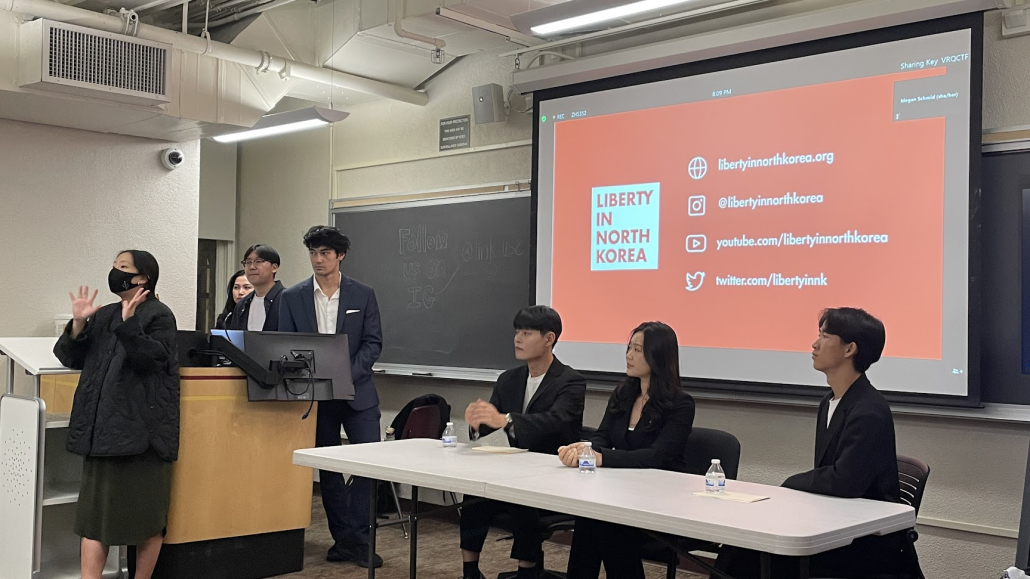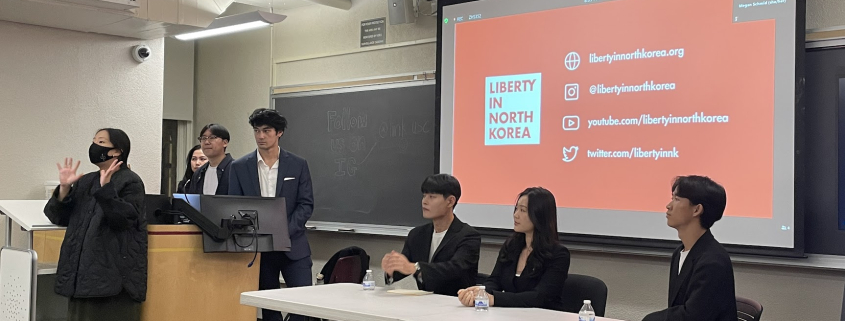Students aid North Korean communities

On a chilly evening in October, Liberty in North Korea USC club members gathered for a screening of the film “To the Lights.” The story followed a daughter’s struggle with the decision of whether to stay with her father, who remained loyal to North Korea, or leave and pursue freedom. After the screening, there was a short Q&A with director Emily Kim, a USC alumna who was formerly involved with the club. Members were privy to one of the first screenings, which left some teary-eyed at the end, making the experience all the more special.
Liberty in North Korea is an international non-governmental organization based in Seoul and Long Beach, California. The organization liberates North Korean citizens and gives them the opportunities and resources they need to thrive outside of the country.
The organization aids refugees’ treacherous 3,000-mile escape into Northern China and down through Southeast Asia, where they are eventually able to file for asylum in South Korea. Since 2009, LINK has helped liberate 1,310 refugees from North Korea’s oppressive regime.
LINK advocates and operates with the help of its university chapters around the country, including LINK USC. LINK also fundraises and educates the public about issues pertaining to North Korean refugees and the Korean peninsula through their university chapters network. The USC chapter is made up of three branches: advocacy, fundraising and social.
The various events the chapter hosts have been integral to building community for LINK USC members. Whether it is visits from guest speakers, film showings or Korean barbeque retreats, the organization’s approach to fostering community helps to engage their community and students on campus, said Sarah Kim, a senior studying law, history and culture and East Asian languages and cultures.
Minjee Park, vice president of advocacy at LINK USC, said the organization this past year has focused on advocacy much more than before. LINK USC holds a speaker event every semester and on Oct. 26, the club invited three North Korean refugees to talk about their experiences and share their life stories.
“I think we’ve put more of an emphasis on advocacy this year than before…So the event that we had last Wednesday was our speaker event, where we invited three North Korean refugees to talk about their experiences, and our past advocacy events have been of a similar nature …So yeah, we do like a lot of we try to bring a lot of different perspectives and different types of events every semester,” Park said.
“For the fundraising branch, we focus on raising money for LINK HQ. It goes towards several different initiatives by LINK; pre-COVID, it went towards refugee escapes, and now the money also goes towards resettlement and education initiatives, like educational opportunities for North Korean refugees who are interested in going abroad,” said Sydney Tsai, vice president of fundraising and a junior studying law, history and culture.
LINK USC not only strives to support Korean refugees, but the student community comprising the organization as well. The club emphasizes community because of its small size, and stresses to both new members and general members that the social health of the organization is a priority, when before it was only fundraising and advocacy.
The chapter system can be hard and limit the things the campus group can do. Chapter president Sarah Kim emphasized how it has fostered a sense of community and allowed the chapter to grow closer.
“It is difficult to be a cog in the machine. We are one chapter under LINK headquarters and they obviously have bigger fish to fry,” Kim said “As far as us being a college chapter, our capabilities are limited. We try to emphasize community by linking up with UCLA or other chapters, but most of our community efforts are targeted towards the USC group.”
LINK USC recently collaborated with the LINK UCLA chapter to co-host its speaker events. The two chapters’ collaboration has helped to foster a greater sense of community between the two schools.
“I think that sometimes a lack of structural support can feel a bit discouraging or frustrating, but I think it also gives us the opportunity to shape the club to what we want it to be, and it gives us more freedom to take initiative and achieve what we want with our various events,” Tsai said.
LINK USC hopes to continue to expand with collaborations, and reach new students at USC in the future, Tsai said.
“I think that we’re trying really hard to grow our community and have a larger general member body, and we are also working really hard to try to expand our horizons and work with other organizations so that we can put out our message more,” Tsai said.

